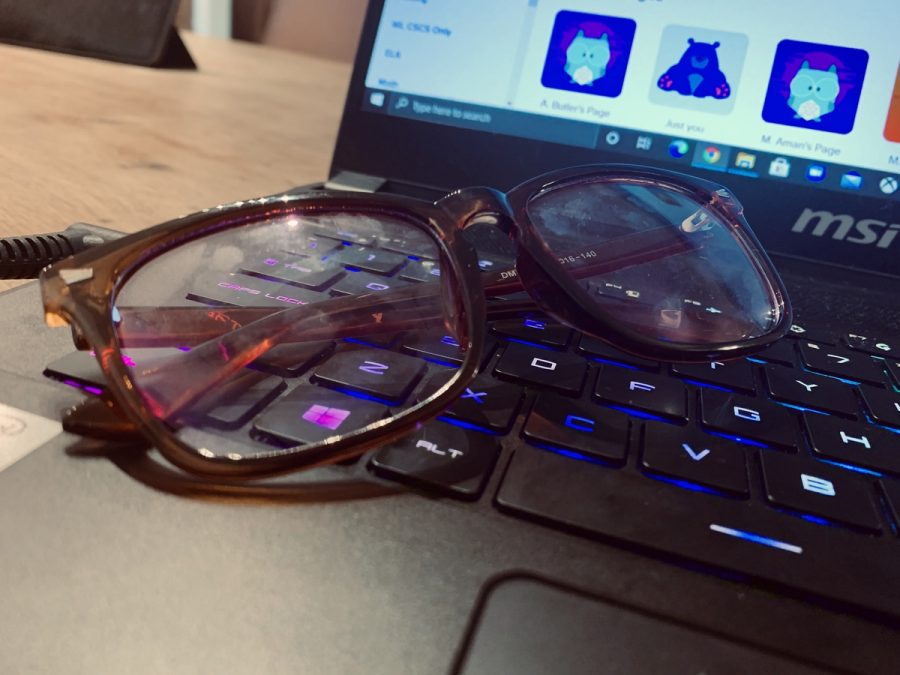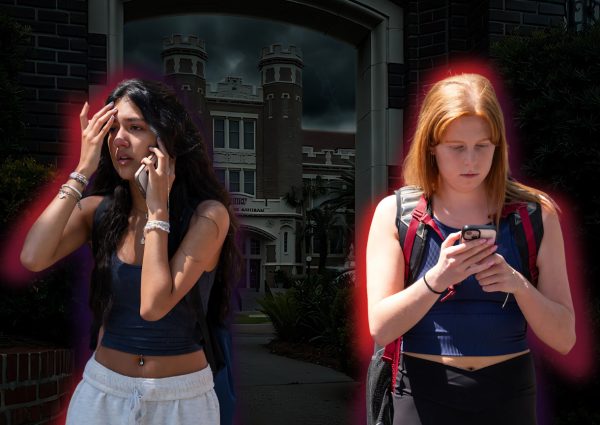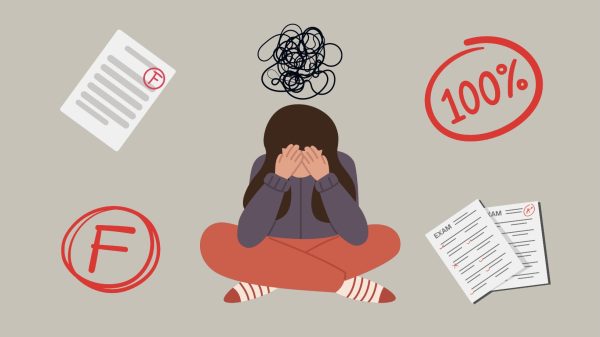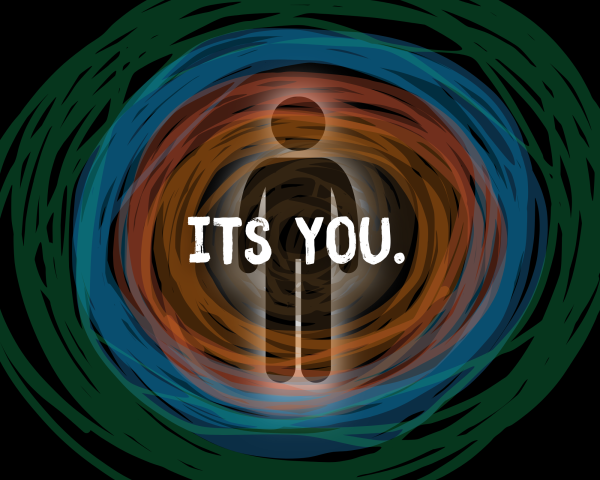Fraud or Fact: Do blue light blocking glasses really help when on the computer?
Over the past week, students and teachers have had to make an adjustment to a new way of learning—online and on zoom. Whereas for some this is a simple change, for others it is much more difficult.
“I usually get headaches around four or five hours into an electronic,” said junior Santiago Pinto.
If you also find yourself with headaches or strained vision after spending so long online, you are not alone. In fact, 60 million worldwide report having Computer Vision Syndrome. Computer Vision Syndrome includes these symptoms, as well as others, like sensitivity in the neck or shoulder regions and happens due to computer usage. But the question is, what about technology causes these symptoms?
If you are to believe the advertisements found for blue light blocking glasses, then you would think the cause is blue light. Blue light is a specific frequency of light, found both naturally and unnaturally. For example, the sun gives off blue light, as well as many electronics and even LED lights. Blue light isn’t always harmful to you despite what these glasses companies may want you to believe. During the day, blue wavelengths help to keep you attentive and awake. It is during the night that this type of light becomes more of an issue.
Blue light is known to disrupt your sleep schedule, as your body is programmed to stay awake during the daytime when this type of light is given off. Can any other symptoms be linked to blue light, though? The answer is no. Blue light simply keeps you awake. It’s not particularly harmful unless used late at night, in which case it may upset your sleep schedule and cause other issues related to that.
Computer Vision Syndrome does not come from over-exposure to blue light. It comes from a combination of other issues related to computer usage. One of these is that reading on the computer is just tough on your eyes. This can be due to glare found on your computer screen. Muscle pain is also caused when you sit at a weird angle, or too close to your screen, in order to view it better. On top of this, if your eyes already have vision issues, eyestrain can be even more prominent.
So, what about blue light glasses in relation to this? One study conducted on blue light glasses showed that there is a lack of evidence when it comes to the beneficial effects of blue light blocking glasses. They may not be harmful, but neither have they been shown to be overly helpful with reducing eye strain. On the contrary, a different study showed that blue light glasses were found to benefit one-third of all participants. From this, it can be concluded that there remains much contradictory evidence about the nature of blue-light glasses.
“I wear blue light glasses sometimes, especially when I have headaches. My sister uses them as well from time to time. We didn’t really start doing so until school moved online. I don’t necessarily feel like they help me, but feel like if I wear them consistently, they will,” said junior Madison Mulvey.
Blue-light blocking glasses could be helpful, but they might also just appear to be beneficial simply because the user believes they will be (the placebo effect). Plus, blue light does not even contribute to eyestrain, so blue light blocking glasses aren’t likely to be helpful in reducing it.
“I wear prescription glasses, which include blue-light blocking. Even with the glasses, after like two periods or something my eyes start to hurt. Even though they do help me see, I don’t really notice a difference in eyestrain when I use my phone with glasses or without the glasses,” said sophomore Julia Fox.
The American Academy of Ophthalmology does not recommend the use of blue light blocking glasses. It instead recommends other solutions to the problems associated with Computer Vision Syndrome. One of these is to make sure you blink. When you use the computer, your eyes tend to blink less. Because of this, sometimes artificial tear drops can be helpful if you find your eyes super dry when using your electronics. Another piece of advice to follow is the 20-20-20 rule. Every 20 minutes when on the computer, take 20 seconds to look at something 20 feet in the distance. This gives your eyes time to relax, blink, and not be so focused on the device in front of you. You can also move your computer to an area where there is not as much glare on the screen, and make sure to sit with good posture in order to not feel the effects of Computer Vision Syndrome so much.
In summary, blue light blocking glasses should not be used to combat the effects of Computer Vision Syndrome. There isn’t enough evidence to prove they are helpful, and plenty of other solutions that are actually proven to have benefits. Even so, if you have trouble sleeping, you may find that blue-light blocking glasses will aid you in fixing your sleep schedule because of the adverse effects blue-light has on sleep.
“Since I started wearing blue light blocking glasses, I have had an easier time going to sleep. Instead of going to bed around 11, I now go to bed around 10. I think I will keep using the glasses regularly and I have felt that they have helped me,” said sophomore Gabriella Bautista.
Sources
- https://www.aoa.org/healthy-eyes/eye-and-vision-conditions/computer-vision-syndrome?sso= y
- https://www.ncbi.nlm.nih.gov/pmc/articles/PMC4784392/
- https://onlinelibrary.wiley.com/doi/abs/10.1111/opo.12406
- https://journals.plos.org/plosone/article?id=10.1371/journal.pone.
- https://www.health.harvard.edu/staying-healthy/blue-light-has-a-dark-sidehttps://www.tmc.ed u/news/2020/01/debunking-blue-light-glasses-claims-to-focus-on-proven-eye-issues/

Madalen Erez is a senior. This is her fourth year on staff. In her free time, she enjoys reading fantasy novels and taking photos of nature.











